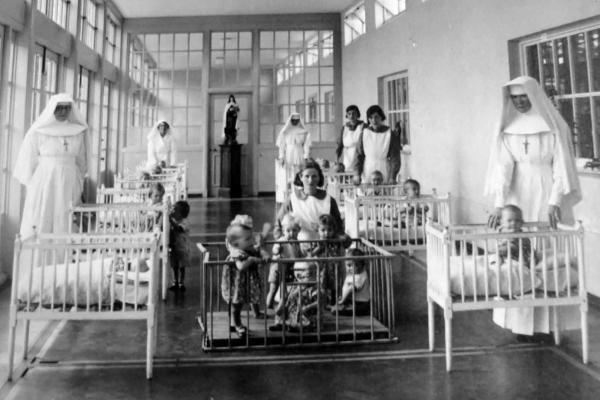WHEN MARI STEED began searching for her birth mother in Ireland, she knew little about the system of secrecy and abuse that would lead her to co-found a social justice group to right its many wrongs. Born in 1960 in a convent-run “mother and baby” home in County Cork, Steed was one of more than 2,000 “banished babies” adopted from Ireland to the United States beginning in the 1940s. As an 18-month-old, she was taken to Philadelphia.
When Steed became pregnant as a teen, she was put in a Catholic-run home in Philadelphia and made to give up her child. In the mid-1990s, she decided it was time to find both the daughter who had been taken from her and the birth mother from whom she’d been taken. Her American family were “decent people,” Steed told me. “I don’t have any serious qualms with my upbringing. But I did begin to search for my mother to find out more about where I’d been.” She created a website to connect with other adopted people of Irish birth.
Eventually, Steed learned her mother, Josie, had given birth to her out of wedlock and had been born to an unwed mother herself. In Ireland, such circumstances put Josie on the full merry-go-round of church-and-state institutions before the age of 30: a county home, an industrial school, 10 years in a “Magdalene laundry,” and finally the mother and baby home. Steed, who lives in Virginia now, recalled she at first had no clue what all this information meant. “‘What are laundries?’ I didn’t even know what that was at the time.”
The answer led Steed down a rabbit hole of secrecy and obstruction. Originally founded in the 18th century as places of refuge for so-called “fallen women,” Magdalene laundries evolved into institutions where women and girls labored for no pay as penance for transgressing Catholic Ireland’s moral and class codes. In his book Ireland’s Magdalen Laundries and the Nation’s Architecture of Containment, Boston College professor James M. Smith described a system of interconnected institutions “including mother and baby homes, industrial and reformatory schools, mental asylums, adoption agencies, and Magdalen laundries.” (Ireland’s first such institution was called the Magdalen Asylum for Penitent Females, using an archaic spelling of Magdalene.)
Read the Full Article

